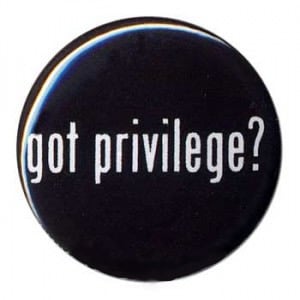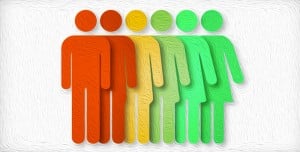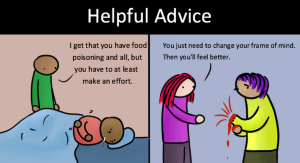It’s extremely rare that I see people having actual conversations about systemic racism. When discussions about race occur, they generally devolve into people of all political affiliations grandstanding about their own lack of interpersonal racism.
Unfortunately, many people’s main priority when discussing issues of race is to prove to others (and themselves) that they are somehow above having racist tendencies.
What’s also unfortunate is that, in general, the only people who admit to having racist tendencies are proud of their racism, reveling in their so-called “outspokenness.”
As a result, we’re left with two groups of people — those who know racism exists but are more hell-bent on convincing the world that they aren’t racists and those who do admit they’re racists but take joy and pride in it.
And hence, the topic of systemic racism, once again, gets completely ignored.
Having racist tendencies is hateful and nothing to be proud of, and these tendencies are something that we should all work to overcome. But anybody who thinks that they are somehow above having racist tendencies is fooling themselves.
They underestimate how powerful systemic racism really is. They are denying that they, too, hold problematic deep-seated racial biases.
Toxic bigoted ideas, through no fault of anyone individually, have been ingrained in all of us.
At the offset, racial dialogues are oftentimes misguided. Some people get defensive, self-righteous, and angry rather than addressing real sociological concerns and the long-term effects that racism has had on this country — and on the world at large.
Here are four lies that so frequently derail conversations about systemic racism.
Lie #1. Racism Only Happens in Individual Interactions
As children, most of us were taught that racism is harmful to society. But for me, the way my classmates and I were taught about the evils of racism was emphasizing how awful it is when one person is racist to another person.
We were taught that to overcome racism, we needed to be kind to one another.
We were constantly reminded that racism wasn’t something to be tolerated.
These were important lessons to learn. Unfortunately, the conversations about race didn’t go any further. This led me to believe that racism only happened during individual interactions.
We’re discouraged from thinking about race as institutional in order to protect those in power, and more specifically, to keep white supremacy alive.
If people are more focused on racism during individual interactions, they will less likely analyze all the ways systemic racism is harmful to society.
Hence creating situations like the one we’re in where powerful people, such as politicians who pass oppressive laws and legislation, are rarely criticized even though they are doing the most damage by using the oppressive structures to their advantages.
In reality, there are many systems currently in place that oppress people of color, but discussions about these institutions almost never happen because we were subtly taught at a young age that those systems don’t even exist.
I was taught in elementary school that the reason why slavery was so heinous was because slave-owners were horrible people. While this is undoubtedly true, it is only addressing the symptom of a much larger problem. Slave-owners are only part of why slavery was so horrific.
For instance, we weren’t taught about how the government created laws and made it legal for white people to own and control black people while black people did not have the power to own and control white people.
We weren’t taught about how the government became economically dependent on slavery, so it was in the government’s best interest to never abolish such a horrific crime against humanity because they were making too much money.
Eradicating people’s racist ideas and behaviors is a noble and worthwhile concept, but this action alone will not solve America’s race problem — it can temporarily stop the bleeding, but it won’t heal the wound.
Consequently, most conversations about racism’s negative effects on society get derailed before they can even begin.
We seldom discuss the long-term ramifications on entire communities due to decades of legal oppression because we put so much emphasis on the importance of individuals and individuals’ feelings.
Even though it is important to address interpersonal racism, overemphasizing this aspect hinders our ability to have deeper and more meaningful dialogues about the sociological effects of racism.
Lie #2. Being Racist is the Worst Thing You Can Be
In addition to centralizing conversations about race to the individual, we, as a society, demonize “being racist” as the worst thing that someone can be.
In reality, even the kindest people filled with generosity can be racist. People who have multiple friends of color and genuinely love them can be racist.
This is because racism is ingrained and taught to all of us by our society, and none of us are immune to being taught and internalizing this society’s racist ideas.
Even though racist thoughts and behaviors should definitely be called out, saying that “racists are evil” implies “non-racists are good,” and this either/or labeling oversimplifies a very complex topic.
At the very outset, we create a number of implications that restrict potentially productive discussions.
First, it implies that racism is like a light-switch that you can turn on-and-off, when in actuality, it’s more like a dial knob that has a wide range of volumes because there is not just one level of racism.
People can be racist where they systemically oppress people of color by passing laws.
People can be racist where they inflict physical damage on others just because of their ethnicity or race.
People can be subtly or even subconsciously racist by holding preconceived notions over entire groups of people without ever overtly causing them harm.
The point is, there are so many layers of racism, and it is much more complex than the all-or-nothing mindset that someone can either be entirely bigoted or entirely unprejudiced.
When we label people as either “racist” or “non-racist,” it gives some individuals the authority to point fingers and label someone else as the enemy. Some people become so obsessed with weeding out other individual racists that they completely ignore the larger picture of systemic racism.
Second, it implies that there are people out there who are somehow unaffected by systemic racism and have no racist tendencies. And some people wear their good deeds as a protective cloak where they feel like they should be immune to criticism about their behaviors towards people of color.
I’ve had many instances when conversations about race eventually deteriorate into a well-intentioned person listing all of the ways they aren’t racist. They’ll bring up their liberal voting records, the charities they’ve donated to, and present a list of their non-white friends.
Whenever someone reacts this way, the entire discussion about race comes to a screeching halt. The conversation now centers around this particular person and so that they can be reassured that they are not racist, and therefore, not a “bad person.”
The very prospect of being an evil racist — which they aren’t — is too overwhelming to handle.
It would be beneficial for open discourse if we didn’t attach such a harsh “evil” label to racism so that people can more easily and freely admit to their own racial biases without feeling like a “bad person.” That way, we can have more honest discussions and figure out ways to overcome these biases together.
Unfortunately, when somebody gets defensive about potentially holding racist ideas, they are unable to look inward to address and overcome their own prejudices.
Their perspectives become so clouded that their egos take precedent over everything else.
The conversation about systemic racism becomes secondary to their feelings, and this type of derailment happens far too frequently. While people’s feelings do matter, their feelings shouldn’t consistently supersede the level of immense damage caused by systemic racism.
Lie #3. People Who Talk Openly and Passionately About Race Are “Too Angry” or “Race Baiters”
For some of my white friends, conversations about race are extremely uncomfortable, especially since racial discussions were generally suppressed for such a long time. And then a few years ago, social media exploded. Now, these types of talks are happening publicly on the Internet on a daily basis.
For people who aren’t used to hearing such open discourse about race, they perceive other people’s anger as “coming out of nowhere.”
Many conversations get derailed by someone — oftentimes a well-intentioned white person — entering into the discussion to try to “calm everybody down.”
They serve as a peacemaker and act like an objective referee which implies that they are the only rational ones while everybody else is acting overly emotional.
They write Facebook statuses longing for the good old days before the Internet when people weren’t “mad all the time.” They write about “outrage culture” and act like social media is what made so many people angry. In their minds, the anger is inexplicable and materialized out of thin air.
But the real reason why these dialogues seemingly “came out of nowhere” is because for a long time, any conversation about race was discouraged.
Bringing up race was considered “race-baiting” since it was implied that systemic racism didn’t exist; therefore, people perceived talking about race as stirring up issues that weren’t there in order to pick a fight.
These “race-baiting” accusations still exist, but thanks to social media, the amount of people having conversations about race has grown substantially.
I don’t feel like most people are necessarily any more or any less angry than they used to be. I think that they’re just more outspoken about their experiences and opinions.
Whenever a well-intentioned white person tries to “calm everybody down,” what they are actually saying is that they would like everybody to go back to suffering in silence because racial conversations make them too uncomfortable.
Sadly, I have personally avoided talking about race with certain white friends as to spare their feelings. I know that they don’t want to hear or think about it because it makes them too upset.
In doing so, I believe I’ve actually done them a disservice because I didn’t accustom them to the real anger I feel — and millions of others feel — about the crushing systemic racism that so many of us face.
They aren’t accustomed to hearing how angry others are about racism because they have been shielded from reality for so long, and they would like to go back to a time when they didn’t have to hear these discussions at all.
4. Racism is Too Sad and Overwhelming To Talk About in Social Settings
When 12-year-old Tamir Rice was killed by the police, and after the horrific shooting in Charleston, many white progressives on my Facebook newsfeed were disappointingly quiet about both of these tragedies.
However, for tragedies such as terrorist attacks on France or the Boston Marathon, they were very vocal about how horrendous these incidents were (as they SHOULD’VE been).
But they seemed more willing to talk about events as long as there wasn’t a racial undertone attached to the story.
I believe that when racially motivated crimes are committed, some people would rather not think or talk about it because the extra added element of racism in conjunction with the atrocity seems too overwhelming. As a result, I believe they would rather ignore the problem in order to avoid feelings powerlessness and despair.
It’s not that they don’t hate racism. They really do despise racism. They abhor it, even.
Probably, if they had a magic wand that could end racism, they would wave it tomorrow.
But, unfortunately, none of that necessarily means that they actually want to think or talk about it — the work that would actually eradicate it.
There’ve been instances when I’ll tell a group of my white friends the subtle and blatant racism that I have to endure daily and they will become chillingly quiet. They look down at their shoes and avoid eye-contact with me.
And they look so sad about my experiences that I end up dropping the conversation completely because I start feeling they were having a party and I ruined their good time.
I also know from experience that if I continue to talk about my struggles for too long, they’ll ask me why I’m bringing this topic up. They’ll get angry that I’m making them think about my problems, and I imagine them thinking to themselves, “Racism seems like such a huge obstacle, what is thinking about it going to do for me other than make me sad?”
I understand this impulse for self-preservation. And while I do believe that it’s healthy to occasionally take breaks from keeping up with the world’s problems, outright willful ignorance to protect yourself is extremely harmful for society.
When enough people consistently ignore the world’s problems, rampant hatred and bigotry is allowed to continue.
Their derailments likely come from caring too much, feeling pained by the atrocities of the world and feeling powerless to do anything about it. So they step into conversations about race to explain how sad these discussions are and justify their actions by claiming that talking about race is “doing nothing” to help.
They just want the noise to stop.
This extremely myopic perspective falls in line with the aforementioned reasons why racial discussions get derailed. Some people fail to see that while they may not be able to help as individuals, if enough people rise up and speak out against injustices, things will change over time.
What needs to happen first is they have to focus on the bigger picture and not just their own personal sadness and discomfort.
***
I believe that dialogues about race would be much more productive if we all admit to ourselves that we hold problematic racial biases that were ingrained in us by our society, and our goal is to identify these ideas and overcome them.
Racism should be more than just a game where people have the opportunity to either pat themselves on the back or point their fingers at others.
I wish that more people realized how large of an issue racism is. Hopefully over time, more people will learn to perceive racism as a larger concept than what occurs in their individual lives.
And hopefully, when they depersonalize these discussions, they can learn to listen and learn about the world’s problems instead of shutting off their ears and derailing these conversations.
[do_widget id=’text-101′]
Robin Tran is a Contributing Writer for Everyday Feminism. She is a standup comedian and blogger, and she holds a BA in English from UC Irvine. In early 2015, Robin came out as transgender woman and has written about her firsthand experiences ever since. She has performed at the Improv, Mad House Comedy Club, and the Comedy Palace, and her articles have been published in xoJane and Time.com.
Search our 3000+ articles!
Read our articles about:
Our online racial justice training
Used by hundreds of universities, non-profits, and businesses.
Click to learn more





















